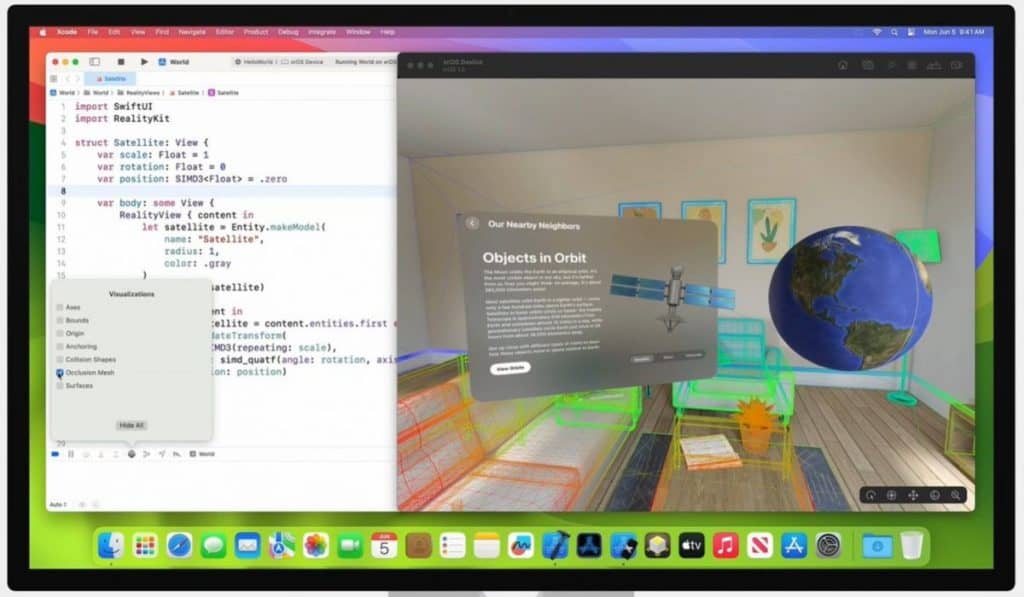Apple Launches VisionOS SDK, Empowering Developers for the Future of VR/AR


In Brief
Apple has launched the VisionOS SDK, providing app creators with tools for augmented reality glasses, including Reality Composer Pro and the Vision Pro simulator.
Developers can test applications on Mac computers and try them on the headsets at AVP Developer Labs.
Apple has unveiled the Software Development Kit (SDK) for VisionOS, the operating system behind the highly anticipated Vision Pro headset. This release provides app creators within the Apple ecosystem with an array of powerful tools tailored for augmented reality glasses, including ARKit, RealityKit, and SwiftUI.

Among the newly introduced tools is Reality Composer Pro, a native immersive content editor that seamlessly integrates with Unity scenes, allowing developers to create captivating experiences. Additionally, the Vision Pro simulator enables testing of applications on Mac computers, while selected developers can try out their creations on the glasses themselves at AVP Developer Labs located in Cupertino, London, Munich, Shanghai, Singapore, and Tokyo. DevKits will be made available to these developers starting in July.
Although the gadget’s official release is scheduled for next year, developers have a unique opportunity to make an impact even before the device hits the market. Already, social media platforms like Twitter and Reddit are buzzing with exciting demos showcasing the potential of upcoming VisionOS applications.
As pioneers in this emerging field, developers have the chance to create the first standout applications for the Vision Pro headset. Just like the groundbreaking software VisiCalc did for the Apple II computer, these innovative apps have the potential to drive adoption and be a major reason why users choose the Vision Pro. This represents a significant opportunity for small but brilliant companies to leave their mark.
While the $3,500 price tag may seem daunting, Apple has plans to expand the accessibility of augmented reality glasses with future iterations such as the Mac, iPad, and Air Vision Pro Headset. As Palmer Lucky aptly, “Before VR becomes something everyone can afford, VR must become something they want,” and Apple is dedicated to making their breakthrough products desirable to a wider audience.
In the comments section, developers and enthusiasts can engage in discussions about the exciting possibilities that VisionOS offers for new applications. Join the conversation and explore the potential of this cutting-edge technology.
In June, Apple has introduced its Vision Pro XR headset, positioning it as the company’s most significant product since the iPhone. Drawing parallels with past revolutions, Apple envisions the Vision Pro as the precursor to a line of immersive devices that will ultimately replace traditional interfaces. Dubbed the “Age of Spatial Computing,” this new era aims to redefine user experience through innovative input methods.

Apple’s presentation refrained from mentioning metaverses and virtual reality, signaling a distinct approach. Unlike competitors embracing virtuality, Apple is committed to preserving social interaction within its immersive ecosystem. Even external observers can see the wearer’s eyes through the helmet’s display, a unique feature that sets it apart from others in the market. The battle between Apple’s strategy and Meta’s virtual-focused direction will unfold, leaving time to reveal the eventual winner.
Regarding specifications and features, Apple has delivered on the numerous rumors that circulated prior to the unveiling. The Vision Pro boasts top-of-the-line displays, lenses, and processors, cementing its position as a leading player in the XR market. However, industry experts are particularly impressed by the user interface, which promises an intuitive and enjoyable experience, marking a significant achievement for Apple.
Despite these triumphs, a few challenges persist. The need for a battery and wired connections contradicts Apple’s signature wireless design philosophy. Additionally, disappointment lingers due to the delayed release, which is now slated for next year, and the hefty price tag of $3,500. Insiders suggest that the initial version will cater to technology enthusiasts and early adopters, with a mass-market iteration expected in the next generation.
For ambitious startups, the arrival of the Vision Pro signifies a pivotal technological shift that should not be overlooked. History has shown that during the onset of previous revolutions, companies like Uber, WhatsApp, Tinder, and SuperCell emerged as industry giants. Today, developers working on VisionOS and Unity have the opportunity to become the stars of this new digital age in the years to come.
Read more about AI:
Disclaimer
In line with the Trust Project guidelines, please note that the information provided on this page is not intended to be and should not be interpreted as legal, tax, investment, financial, or any other form of advice. It is important to only invest what you can afford to lose and to seek independent financial advice if you have any doubts. For further information, we suggest referring to the terms and conditions as well as the help and support pages provided by the issuer or advertiser. MetaversePost is committed to accurate, unbiased reporting, but market conditions are subject to change without notice.
About The Author
Damir is the team leader, product manager, and editor at Metaverse Post, covering topics such as AI/ML, AGI, LLMs, Metaverse, and Web3-related fields. His articles attract a massive audience of over a million users every month. He appears to be an expert with 10 years of experience in SEO and digital marketing. Damir has been mentioned in Mashable, Wired, Cointelegraph, The New Yorker, Inside.com, Entrepreneur, BeInCrypto, and other publications. He travels between the UAE, Turkey, Russia, and the CIS as a digital nomad. Damir earned a bachelor's degree in physics, which he believes has given him the critical thinking skills needed to be successful in the ever-changing landscape of the internet.
More articles

Damir is the team leader, product manager, and editor at Metaverse Post, covering topics such as AI/ML, AGI, LLMs, Metaverse, and Web3-related fields. His articles attract a massive audience of over a million users every month. He appears to be an expert with 10 years of experience in SEO and digital marketing. Damir has been mentioned in Mashable, Wired, Cointelegraph, The New Yorker, Inside.com, Entrepreneur, BeInCrypto, and other publications. He travels between the UAE, Turkey, Russia, and the CIS as a digital nomad. Damir earned a bachelor's degree in physics, which he believes has given him the critical thinking skills needed to be successful in the ever-changing landscape of the internet.



















































